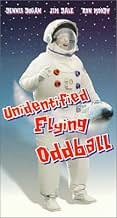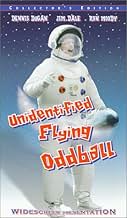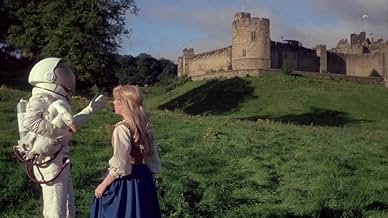CALIFICACIÓN DE IMDb
5.2/10
1.5 k
TU CALIFICACIÓN
Agrega una trama en tu idiomaAn astronaut and his android double travel back to the time of King Arthur.An astronaut and his android double travel back to the time of King Arthur.An astronaut and his android double travel back to the time of King Arthur.
John Le Mesurier
- Sir Gawain
- (as John le Mesurier)
Bruce Boa
- Air Force Officer
- (sin créditos)
Al Lampert
- NASA Technician
- (sin créditos)
Derek Suthern
- NASA VIP
- (sin créditos)
Opiniones destacadas
Disney was in a pathway of making films with an educational twist.My previous review of "2000 leagues under the sea" is likewise to this as its aim also was to educate as well as entertain.
"Unidentified Fying Oddball" is a film educating its audience (mainly targeting children) of science. Scenes include "Making Robots" & "Maganetisim".
This film itself has a whole ray of cast.We are presented with Jim Dale, "British Actor" whom worked in numerous Carry On's such as "Screaming" & "Don't lose your head".Kenneth More is also present which is more known as playing the German King "Kaiser Wilhelm" in "Oh what a lovely War"
The film itself though entails the time travel of an Astronaut into King Arthur's time,landing in Cornwall.
The film has various good scenes and do provide a good laugh.The additional adding of cutlery to Sir Mordred sword by Clarence or the Magnatising of the troops to Tom's spaceship.
The film does however fall flat in several occasions,and it does drag a bit.Kids might enjoy it but certainly myself couldn't see myself picking this over other Disney classics,but it is a good film to watch and be educated.
"Unidentified Fying Oddball" is a film educating its audience (mainly targeting children) of science. Scenes include "Making Robots" & "Maganetisim".
This film itself has a whole ray of cast.We are presented with Jim Dale, "British Actor" whom worked in numerous Carry On's such as "Screaming" & "Don't lose your head".Kenneth More is also present which is more known as playing the German King "Kaiser Wilhelm" in "Oh what a lovely War"
The film itself though entails the time travel of an Astronaut into King Arthur's time,landing in Cornwall.
The film has various good scenes and do provide a good laugh.The additional adding of cutlery to Sir Mordred sword by Clarence or the Magnatising of the troops to Tom's spaceship.
The film does however fall flat in several occasions,and it does drag a bit.Kids might enjoy it but certainly myself couldn't see myself picking this over other Disney classics,but it is a good film to watch and be educated.
Based on the ratings and reviews, this movie seems to have a problem with expectation management. It's a Disney movie, but its production standards aren't as uniformly high as one might expect. Apparently they had to cut some corners. This film came out 2 years after La guerra de las galaxias (1977), but its special effects aren't far above Viaje a las estrellas (1966) in quality. Also there is something odd about the plot that suggests late changes. (Someone just disappears, suggesting that he died, and is never mourned.)
Some reviewers complain about a lack of realism. I think they are really missing the point. This kind of movie doesn't have to be realistic. The original novel is basically an extended joke, and so is this film. What matters is whether it is a good joke and whether it follows the internal logic of fiction. On these accounts its actually a really good movie.
LONG DIGRESSION ON LANGUAGE
In his novel A Connecticut Yankee at King Arthur's Court, Mark Twain dates King Arthur (who likely wasn't a historical person) in the 6th century, and so does this film, which is very loosely based on the book. To get an idea of how long ago that was:
What we think of as England today wasn't a country yet but a region consisting of many small countries. The Romans had left in the early 5th century, and Anglo-Saxons from the North Sea coast of Germany, Denmark and the Netherlands were coming to England, bringing with them the Germanic dialects that would soon develop into Old English (also called Anglo-Saxon). But at the time of the film's setting we don't even call that language Old English yet because that name is preserved for the earliest form preserved in writing. It wasn't before the following century, the 7th century, that England became mostly Christian and the earliest preserved texts in Old English were written.
Here is what the Lord's Prayer looked like in 995, over 400 years AFTER the supposed time of King Arthur:
Fæder uure / þuu þee eart on heofonum / Sii þiin nama gehaalgod / Too becume þiin rice / Gewurþe þiin willa / On erðon swaa swaa on heofonum / ...
Mark Twain would have had a hard time writing in this language, and his readers wouldn't have understood him. Even Middle English was too antiquated for his purposes. Here is the same text in a Middle English version from 1389:
Oure fadir / That art in hevenes / Halwid be thi name / Thi kingdom come to / Be thi wille don / On erthe as in hevenes / ...
Much better, but still too antiquated. So Mark Twain used the English of Shakespeare and the original King James Bible: Early Modern English. And so do most film adaptations. Only, they almost invariably get the grammar wrong. Which is very jarring to speakers of other Germanic languages, who tend to have a better feel for Early Modern English grammar than most native English speakers. Anyway, here is a correct version from 1611 in Early Modern English, taken from the King James Bible:
Our father which art in heauen, / hallowed be thy name / Thy kingdome come. / Thy will be done, / in earth, as it is in heauen. / ...
I am glad that this film generally doesn't even try to use Early Modern English in the dialogs, leaving only a few instances of the usual wrong grammar and making the dialogs flow better.
END OF DIGRESSION.
Of course the time travel aspect (and in fact also the space travel aspect) isn't realistic either. And doesn't have to be. All that matters is that it follows its own internal logic. Which it does.
The film's plot makes good use of the idea of an astronaut arriving at King Arthur's court rather than a distant planet. Unfortunately it overdoes the special effects, which are not its strength, and doesn't make as much use of its excellent actors as it could have done. But overall it's great fun if you are prepared to be entertained.
Some reviewers complain about a lack of realism. I think they are really missing the point. This kind of movie doesn't have to be realistic. The original novel is basically an extended joke, and so is this film. What matters is whether it is a good joke and whether it follows the internal logic of fiction. On these accounts its actually a really good movie.
LONG DIGRESSION ON LANGUAGE
In his novel A Connecticut Yankee at King Arthur's Court, Mark Twain dates King Arthur (who likely wasn't a historical person) in the 6th century, and so does this film, which is very loosely based on the book. To get an idea of how long ago that was:
What we think of as England today wasn't a country yet but a region consisting of many small countries. The Romans had left in the early 5th century, and Anglo-Saxons from the North Sea coast of Germany, Denmark and the Netherlands were coming to England, bringing with them the Germanic dialects that would soon develop into Old English (also called Anglo-Saxon). But at the time of the film's setting we don't even call that language Old English yet because that name is preserved for the earliest form preserved in writing. It wasn't before the following century, the 7th century, that England became mostly Christian and the earliest preserved texts in Old English were written.
Here is what the Lord's Prayer looked like in 995, over 400 years AFTER the supposed time of King Arthur:
Fæder uure / þuu þee eart on heofonum / Sii þiin nama gehaalgod / Too becume þiin rice / Gewurþe þiin willa / On erðon swaa swaa on heofonum / ...
Mark Twain would have had a hard time writing in this language, and his readers wouldn't have understood him. Even Middle English was too antiquated for his purposes. Here is the same text in a Middle English version from 1389:
Oure fadir / That art in hevenes / Halwid be thi name / Thi kingdom come to / Be thi wille don / On erthe as in hevenes / ...
Much better, but still too antiquated. So Mark Twain used the English of Shakespeare and the original King James Bible: Early Modern English. And so do most film adaptations. Only, they almost invariably get the grammar wrong. Which is very jarring to speakers of other Germanic languages, who tend to have a better feel for Early Modern English grammar than most native English speakers. Anyway, here is a correct version from 1611 in Early Modern English, taken from the King James Bible:
Our father which art in heauen, / hallowed be thy name / Thy kingdome come. / Thy will be done, / in earth, as it is in heauen. / ...
I am glad that this film generally doesn't even try to use Early Modern English in the dialogs, leaving only a few instances of the usual wrong grammar and making the dialogs flow better.
END OF DIGRESSION.
Of course the time travel aspect (and in fact also the space travel aspect) isn't realistic either. And doesn't have to be. All that matters is that it follows its own internal logic. Which it does.
The film's plot makes good use of the idea of an astronaut arriving at King Arthur's court rather than a distant planet. Unfortunately it overdoes the special effects, which are not its strength, and doesn't make as much use of its excellent actors as it could have done. But overall it's great fun if you are prepared to be entertained.
UNIDENTIFIED FLYING ODDBALL is a '70s version of the classic Mark Twain story, A CONNECTICUT YANKEE IN KING ARTHUR'S COURT. The story has been updated to the space age, with a lone young astronaut and his android double breaking through a time barrier in space and finding themselves back in King Arthur's day, where they must battle evil and romance willing maidens and the like.
It's all very juvenile, of course, but then you expect little else from a Disney production. However, like a lot of Disney movies, UNIDENTIFIED FLYING ODDBALL is a colourful romp through medieval times and one that's filled with incident, so there's plenty to enjoy here, as long as you like your entertainment basic and your jokes rather obvious. I thought the main American star, Dennis Dugan, was poor indeed, but the supporting cast of British character actors makes up for him: Jim Dale, cast against type as the villain; Ron Moody as the delightfully sneaky Merlin; a near unrecognisably aged Kenneth Moore as Arthur; and the reliable Rodney Bewes and John Le Mesurier in comic support.
It's all very juvenile, of course, but then you expect little else from a Disney production. However, like a lot of Disney movies, UNIDENTIFIED FLYING ODDBALL is a colourful romp through medieval times and one that's filled with incident, so there's plenty to enjoy here, as long as you like your entertainment basic and your jokes rather obvious. I thought the main American star, Dennis Dugan, was poor indeed, but the supporting cast of British character actors makes up for him: Jim Dale, cast against type as the villain; Ron Moody as the delightfully sneaky Merlin; a near unrecognisably aged Kenneth Moore as Arthur; and the reliable Rodney Bewes and John Le Mesurier in comic support.
This movie certainly has its moments. It's quirky and weird, with some truly original scenes, which is what makes it intriguing. Unfortunately, that is the only thing that is good about it, and it's not enough to keep it entertaining for its entire runtime.
Those little bits of weirdness might work better in a short film, but ultimately I was bored with this feature very quickly. The acting is bad and the goofiness of the whole thing gets annoying after a few minutes. Do not recommend.
Those little bits of weirdness might work better in a short film, but ultimately I was bored with this feature very quickly. The acting is bad and the goofiness of the whole thing gets annoying after a few minutes. Do not recommend.
Average.
I don't like or dislike 'Unidentified Flying Oddball'. It features a cool concept, but the film never really gets overly intriguing while the cast are rather plain and uninteresting.
Dennis Dugan never really works for me as Tom. I feel his character is way too content with what occurs, especially at the beginning - no surprise, no shock... nothing. That's odd to me, given what occurs. Jim Dale, who is excellent in 1978's 'Hot Lead and Cold Feet', is underwhelming. Kenneth More, meanwhile, is alright as King Arthur.
In a word, forgettable. Glad it only lasts 93 minutes.
I don't like or dislike 'Unidentified Flying Oddball'. It features a cool concept, but the film never really gets overly intriguing while the cast are rather plain and uninteresting.
Dennis Dugan never really works for me as Tom. I feel his character is way too content with what occurs, especially at the beginning - no surprise, no shock... nothing. That's odd to me, given what occurs. Jim Dale, who is excellent in 1978's 'Hot Lead and Cold Feet', is underwhelming. Kenneth More, meanwhile, is alright as King Arthur.
In a word, forgettable. Glad it only lasts 93 minutes.
¿Sabías que…?
- TriviaThe Stardust ship prop now resides in a very old fairground/theme park called Blackgang Chine on the Isle of Wight in the UK. Visitors used to be able to explore the interior, but is now off-limits except to look at from the outside.
- ErroresWhen Tom is flying during the battle scene near the end, wires that are holding the jet are clearly visible in several shots.
- ConexionesEdited into Disneylandia: The Spaceman and King Arthur: Part 1 (1982)
Selecciones populares
Inicia sesión para calificar y agrega a la lista de videos para obtener recomendaciones personalizadas
- How long is Unidentified Flying Oddball?Con tecnología de Alexa
Detalles
- Fecha de lanzamiento
- País de origen
- Sitio oficial
- Idioma
- También se conoce como
- A Spaceman in King Arthur's Court
- Locaciones de filmación
- Productora
- Ver más créditos de la compañía en IMDbPro
- Tiempo de ejecución
- 1h 33min(93 min)
- Relación de aspecto
- 1.66 : 1
Contribuir a esta página
Sugiere una edición o agrega el contenido que falta




































